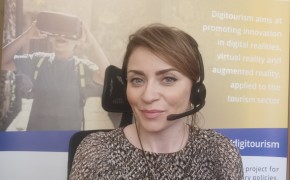The Tourist Passport is an annual marketing campaign encouraging people to travel and discover both famous and less known places in our region.
Our experience has shown that the region is unexplored even by its inhabitants. During the summer season, residents choose traditional leisure destinations (in Poland these are the two key directions, i.e. the mountains and the sea), often overlooking the equally attractive immediate neighbourhood. We aimed to simultaneously build a regional identity and influence the development of the tourism industry.
Tourists and residents of the region receive a guide to the region in the form of an application, and by using it they can participate in a game/competition in which they can win prizes (vouchers for stays and tourist attractions). One of the key elements is the repeatability and recognisability of the action. This year's action will be already the tenth one.Participants of the action come back and create plans of short trips according to it. The stakeholders of our action are members of the Kujawsko-Pomorskie Tourist Organisation - KPTO (Local Governments, Local Tourist Organisations, tourism industry), who represent the local community and the tourism industry. Beneficiaries of the action are tourists from the region (they spend more time getting to know their region) and tourists from outside the region (they treat the application as a mini-guide to the region). Beneficiaries are also owners or managers of places to which tourists are directed. Tourists with the passport application often plan their trip, choose accommodation and attractions based on our recommendations.
Resources needed
The biggest and one-off cost was the application itself (approx. 10000€). Every year it needs updating and maintenance work, but these costs are lower (about 2000 €). The content is carried out by employees of KPTO (2-3 people) in cooperation with the authors of the application.
Evidence of success
As a measure of success we can consider the fact that this year we are implementing the10th edition. The campaign has won recognition from the industry with numerous awards and distinctions. Last year's edition - the first one based only on the application - was nominated in the Mobile Trends Awards – the most prestigious award in the mobile industry. The nominees competing for both the nomination and the award are judged on perfection, adaptation to user needs, innovation and recognition.
Difficulties encountered
The most important lesson learned from several years of the project was to move from a booklet to an app. By doing so,we overcame many difficulties. The app requires that a place be within range of a mobile network.In last year's edition we had to give up one site (a natural monument)for this reason
Potential for learning or transfer
This practice can be not only very inspiring but also relatively easy to transfer and implement in any other region or city. The partners of the Digitourism project were very interested in this practice during the virtual study visit and expressed their wish to create similar applications.
A virtual guide with game/play/entertainment elements is a great way to encourage adults and children to discover new, often less known places. The app is also an excellent tool for directing tourists' attention to less visited places, thus it can help to maintain the balance of the destination, which can be helpful in the case of large and very popular tourist destinations/sites.
Tags: Challenges, Creative tourism, Digitalisation, Smart, Study visit, Tourism








